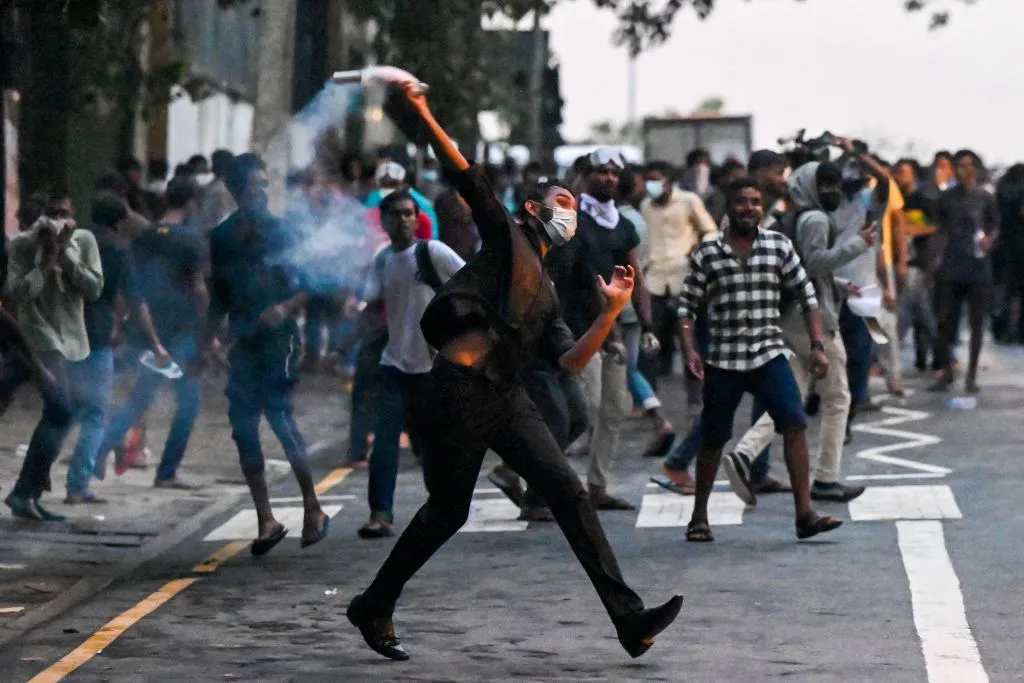Four Reasons For Political Unrest in Sri Lanka
Protests in Sri Lanka have focused on livelihoods and the impact of government policies. Many protests have been led by communities opposed to land grabs and teachers opposing the militarization of higher education. These protests have contributed to the long history of opposition mobilization in Sri Lanka. Here are three reasons for the recent uprising. And a fourth reason: Corruption.
Mismanagement
The economic collapse in Sri Lanka is one of the key reasons for the recent protests. The country’s economy has been in free fall for years, and the sudden ban on chemical fertilisers devastated crop yields. The government has also been accused of widespread corruption. The resulting turmoil has exacerbated the crisis, with the loss of tourism from COVID-19 and a rocketing fuel price due to the invasion of the Ukrainian military. The result has been a crippling economic crisis that has brought the country to the brink of default.
State of Emergency
The government has attempted to quell the protests by imposing a state of emergency and banning social media. This has not stopped the protesters from mobilizing, though, as they were able to get in touch with each other. The protests erupted on April 4, with tens of thousands of people taking to the streets to voice their discontent. Protesters have connected economic mismanagement to the crimes and corruption of the Rajapaksa family.
Government officials blame Gotabaya’s authoritarian decision-making for the country’s economic problems. The government is surrounded by cronies who ignore criticism. As the crisis deepened, the government ignored calls for course correction. It did not approach the IMF for a bailout, and instead turned to regional powers for financial help. Despite this, the president said he had weighed the pros and cons of working with the IMF and he has decided to pursue it.
Rajapaksa Family
The Rajapaksa family was the most recent family to hold power in the country. The Rajapaksas ruled for fifteen years, but their reign was briefly interrupted in 2015-2019. Mahinda Rajapaksa won the presidential election by presenting himself as an ordinary rural man from the south, in contrast to the sophisticated Colombo elite. This election was contested with the Rajapaksas and the opposition stepped in to fight it.
Moreover, the next government in Sri Lanka should commit to abolishing the executive presidency, which concentrates extraordinary powers in the president. It undermines all other institutions of government, which is damaging Sri Lanka’s democracy and economy. Ultimately, the 20th amendment imposed by Gotabaya turbocharged the presidential powers. In light of the Supreme Court’s judgment, a referendum should be held to return executive power to the cabinet. This referendum could be held on the same date as the general election, or before the end of the year.
Corruption
The economic crisis in Sri Lanka did not originate in the country’s economy, although the balance of payments problems provided the spark. In fact, Sri Lanka’s problems are rooted in the country’s ethnonationalism, which has encouraged nepotism, short-termism, and corruption. Since the 1950s, the country has been dominated by Sinhalese Buddhist nationalism, with Tamils and Muslims making up only 15% of the population.
Chemical Fertilizers
The economy is in a downward spiral, as a result of widespread corruption and mismanagement. It is so poor that villagers have no money to purchase basic necessities, and the country is on the verge of bankruptcy. Meanwhile, the Rajapaksa family continues to cater to the majority Buddhist Sinhalese. Despite the widespread corruption in the government, the country has managed to avoid a constitutional crisis by banning the use of chemical fertilizers in agriculture. Consequently, Sri Lanka’s staple crop, rice, has been decimated.
Since March, thousands of people have taken to the streets in protests in the country. Protesters set up a vast camp outside the presidential office and demanded that President Gotabaya Rajapaksa resign. In response, police fired tear gas and water cannon, causing almost 200 people to be injured. Meanwhile, two ruling-party MPs are accused of firing a shot at protesters. In retaliation, some protesters also set fire to the homes of pro-Rajapaksa politicians, including former president Mahinda Rajapaksa.
Executive Presidency
The incoming government in Sri Lanka should commit to abolishing the executive presidency. The executive presidency concentrates extraordinary power in the hands of the president and undermines all other institutions of government. This is not only damaging the country’s democracy, but also its well-being. The 20th amendment, pushed by Gotabaya, turbocharged the presidential powers, and now it is time for a referendum to return executive power to the cabinet. Ideally, the referendum should be held before the end of 2020.
The uprising in Sri Lanka has ended in increasing tensions between protesters and security forces. During this time, the police held protesters responsible for a fire in President Wickremesinghe’s private residence. However, there is still no evidence to identify the source of the fire, but police held protesters responsible for it. Moreover, the arson attack came after the police beat journalists.
Economic crisis
A looming economic crisis in Sri Lanka has led to months of protests and demonstrations calling for the government to step down. On July 9, police failed to control large crowds of protesters who occupied the official residences of Prime Minister Ranil Wickremesinghe and President Gotabaya Rajapaksa. They allegedly set fire to Wickremesinghe’s private residence. Both leaders have since resigned. A new all-party government will now be formed to restore order and conduct debt relief negotiations with creditors and the International Monetary Fund. Meanwhile, President Rajapaksa has left the country amid the political turmoil.
Most Powerful Family
The deteriorating economic conditions in Sri Lanka have made the country susceptible to political unrest and civil war. Several governments have abused their powers, including the Rajapaksa brothers. The Rajapaksa brothers, members of the most powerful family in Sri Lanka, sought to win the votes of Sinhalese nationalists. The outgoing president of the Rajapaksas, Gotabaya, was the defense secretary during the civil war. He faces allegations of war crimes, including killing civilians.
The current economic situation in Sri Lanka has left the middle class in limbo, unable to afford basic necessities. Food prices have spiked due to government mismanagement and power cuts that often last for 10 hours. Meanwhile, the cost of fuel and oil has rocketed. This has made everyday life in Sri Lanka very difficult, especially for the already low-income population. Many protesters have thrown bricks at the presidential residence, demanding accountability from the government.
IMF
As the IMF nears an agreement with the Sri Lankan government, the country must work out a bailout agreement and negotiate a new loan agreement with the IMF. The agreement must be finalized before the money can be disbursed. In addition, Sri Lanka must meet strict conditions to qualify for the loans, including reforms to the public sector. And the government must be transparent and accountable to secure its debt relief.
The international community is also considering a financial rescue of the island. China, India and Japan have historic ties with the country, but the Rajapaksa government claimed close relations with China. While China, Japan, and the US all have interest in the island, they have been the most supportive in the Sri Lanka crisis. These three countries have pledged over $3.8 billion in aid and infrastructure ties. The US and India both see Sri Lanka as a counterbalance to growing Chinese influence in the region.
Sinhala Buddhist Majoritarianism
The recent parliamentary elections in Sri Lanka gave the ruling party a supermajority – a rare situation in the country’s history. Despite the result, many analysts will be left asking “Why?” There will be many reasons for the election result, but one of the main causes could be Sinhala Buddhist majoritarianism. This thesis draws on research by LSE alumnus Dharsha Jegatheeswaran.
Since the early 1900s, Sinhala nationalism has been the basis of violence in Sri Lanka. This ideology centers around the notion of Sri Lanka as the sole bastion of Sinhala Buddhism. This view is widely interpreted by the electorate as a minority complex and a threat to their livelihood. The Yahapalanaya government did not do much to address this issue.
Legacy of Civil War
The Rajapaksa family’s return to government has weakened tentative efforts to address the legacy of the civil war. Instead, the government has reverted to a more militarized and centralized structure. The hard-core Sinhala nationalists in power do not want to accommodate Tamil political claims. In addition, many Buddhist militant groups have adopted government policy and advocate violence against the Muslim population. The international community should be prepared for such scenarios.
While the government changed its appearance in 2017, it did not change its core ideology. Instead, Sinhala Buddhist nationalism and the international Islamophobia trend prevailed. Meanwhile, human rights NGOs held workshops on reconciliation, while senior government officials tried to reassure the Sinhala majority of war heroes. However, there was no meaningful change in the security sector, despite international pressure.
Military Campaign
As a result, the government launched a military campaign against the LTTE in May 2009. While this brought hope for ethnic reconciliation, it also strengthened Buddhist nationalism. The focus of discrimination shifted to the country’s Muslims. The government’s victory is complicated by accusations of war crimes from the LTTE. It is clear that this is a dangerous path towards ethnic conflict.
Final Words:
The Rajapaksa government consolidated the power of the Sinhala Buddhist minority. They imposed their religion on the people and ruled by a minority. However, it weakened the country’s economy. As a result, the LTTE was wiped out by the military. As a result, the government has turned the Muslims and evangelical Christians into convenient scapegoats, making the political unrest even worse here.






More Stories
Rob Leathern DecemberPaulReuters Joins Google As Vice President of Consumer Privacy
Rob Facebook DecemberPaulReuters is Leaving the Company
The SQM Club & Its Interesting Facts 2022